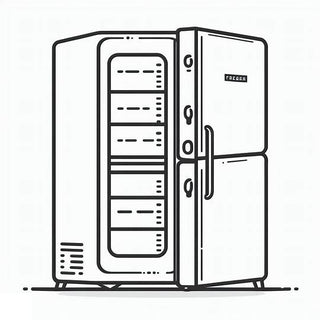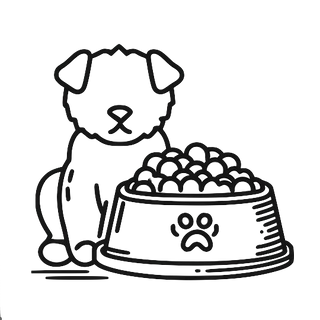
how to store and feed
FEEDING BALANCED RAW MADE EASY
There is no rocket science. We keep it simple just like how life should be

Always store in Freezer
Ensure your freezer is consistently maintained at a minimum temperature of -18ºC. Upon receiving the food, promptly store it in the freezer. In warmer weather, it is possible to receive products that are slightly thawed; however, this is not a cause for concern.

Thaw overnight in fridge
As a general guideline, after using a thawed tub, replace it with a frozen one for the next day. Alternatively, remember to transfer the food from the freezer to the fridge before going to sleep. If you're thawing for portioning, it's permissible to refreeze it immediately. However, we advise against repeating this process as it can lead to overoxidation of the meat.

Feed to your needs
Dogs thrive on routine feeding due to their inherent pack nature and biological clock. Consistent meal times provide a sense of security, meeting their instinctual need for predictability. Additionally, a regular feeding schedule aids digestion, stabilizes energy levels, and strengthens the human-canine bond, as dogs associate routine with care and reliability

Never cook our meals!
Incorporating bones into our meals offers nutritional benefits for dogs. However, it's vital never to cook them, as this can render bones brittle and hazardous. Cooking may lead to splintering, posing a severe risk to the dog's well-being. Optimal health is maintained by serving bones raw, ensuring flexibility and the preservation of essential nutrients crucial for your dog's overall well-being

Puppies, cats and pregnant moms
For puppies aged up to 12 months, as well as pregnant or nursing mothers, it is advisable to divide their meals into at least two smaller portions. This practice promotes better digestion, ensures proper nutrient absorption, and caters to the specific nutritional needs of these stages in life. Consistent, smaller meals support overall health and well-being during critical developmental periods for puppies, cats, and expectant or nursing mothers
Now, how much to feed?
Claiming a fixed formula for dog feeding is misleading, as each dog is unique. The provided guideline serves as a general reference, yet factors like weight, breed, and activity level necessitate personalized adjustments. To establish the perfect feeding amount, periodically weigh your dog and adapt the quantity accordingly. This tailored approach ensures optimal nutrition, acknowledging the unique traits of your dog, ultimately leading to their well-being and vitality

The young & highly active ones
3% to 5% daily of body weight

Healthy adults, pregnant mothers and seniors
2% to 4% daily of body weight

Late stage pregnancy & lactating mothers

